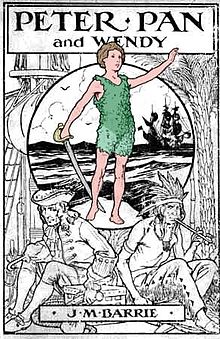Novelization
Film novelizations were especially profitable during the 1970s before home video became available,[1] as they were then the only way to re-experience popular movies other than television airing or a rerelease in theaters.[3] Even after the advent of home video, film novelizations remain popular, with the adaptation of Godzilla (2014) being included on The New York Times Best Seller list for mass-market paperbacks.[8] It might take an insider to tell whether a novelization diverges unintentionally from the final film because it is based on an earlier version which included deleted scenes.A writer has these rights if he contributed the source material (or added a great deal of creative input to it) and if he was moreover properly credited.Star Wars: From the Adventures of Luke Skywalker was published under the name of George Lucas but his script had been novelized by the prolific tie-in writer Alan Dean Foster.[14] The writer or script doctor responsible for the so-called "final" version is not necessarily the artist who has contributed the original idea or most of the scenes.An acquiring editor who intends to hire one of the credited screenwriters has to reckon that the early writers are no longer familiar with the current draft or work already on another film script.[16] Writers Guild of America rules require that screenwriters have right of first refusal to write novelizations of their own films, but they rarely do so because of the lack of prestige and money.David Morrell wrote the novel First Blood about John Rambo, which led to the film adaptation of the same name.[24][25] While increasingly also a domain of previously established novelists, tie-in writing still has the disadvantages, from the writers' point of view, of modest pay, tight deadlines and no ownership in the intellectual property created.Episodes of Star Trek were adapted into short stories by the noted science fiction writer James Blish.[15] In the early 1970s Lee Falk was asked by the Avon publishing house to deliver Phantom novels based on the eponymous comic strip.Itoh was set to write novelizations of Metal Gear Solid 3: Snake Eater and Metal Gear Solid: Peace Walker, but his death in 2009 resulted in these projects being handed to Beatless author Satoshi Hase and a new writer named Hitori Nojima (a pen name for Kenji Yano) respectively.Ian Fleming's 1961 James Bond novel Thunderball was based on a script he had co-written; in this case his collaborators subsequently sued for plagiarism.Gordon Williams wrote the script and novelization for producer Harry Saltzman's abandoned film The Micronauts.


Literary adaptationPeter and WendyderivativeTV seriesstage playcomic bookvideo gamehome videoLes VampiresLondon After MidnightKing KongStar WarsShadowkeepGodzillaThe New York Times Best Seller listblockbusterscreenplayintrospectiondirector's cutCapricorn OneGladiatorChristopher WoodThe Spy Who Loved Me1962 Ian Fleming novelJames Bond, The Spy Who Loved MeGeorge Lucastie-inAlan Dean FosterXenomorphMax Allan CollinsRoad to Perditiongraphic novel of the same nameModesty Blaisescript doctorfilm directorWriters Guild of Americaright of first refusalfilm adaptationArthur C. ClarkeStanley Kubrickshort storiesexpositionDavid MorrellFirst BloodJohn Rambofilm adaptation of the same nameparagraphcontractfilm producerssequelSimon TemplarJames Bondmedia franchisesfeature filmThe SaintcharacterLeslie Charterisits novelizationIan FlemingJames Bond novelsJohn GardnerLicence to KillGoldenEyeRaymond BensonThe World Is Not EnoughClassics IllustratedThe Adventures of SupermanGeorge LowtherIn the Line of FireArthur Calder-MarshallWilliam KotzwinkleRichard ElmanKen FollettIsaac Asimovtie-in fictionDoctor WhoJames Blishanimated seriesBeverly Hills, 90210story arcLee FalkAvon publishing housePhantom novelseponymous comic stripPeter O'DonnellMatt Forbeckwriter of novelsS. D. PerryResident Evil video gamesResident Evil ZeroEric NylundprequelMetal Gear SolidProject ItohBeatlessDeath StrandingThunderballFrederick ForsythThe Devil's AlternativeCormac McCarthyNo Country for Old MenCoen brothersfilm of the same nameGordon WilliamsHarry SaltzmanList of novels based on comicsBack to the FutureGeorge GipeBerkley BooksBack to the Future Part IICraig Shaw GardnerBack to the Future Part IIIBad News BearsThe Bad News BearsThe Bad News Bears in Breaking TrainingThe Bad News Bears Go to JapanBlade RunnerK. W. JeterBantam BooksSpectraGollanczDollars TrilogyA Fistful of DollarsFrank ChandlerFor a Few Dollars MoreThe Good, the Bad and the Ugly